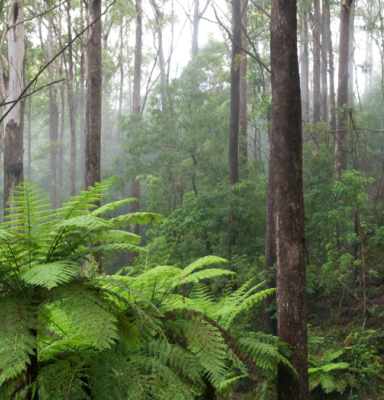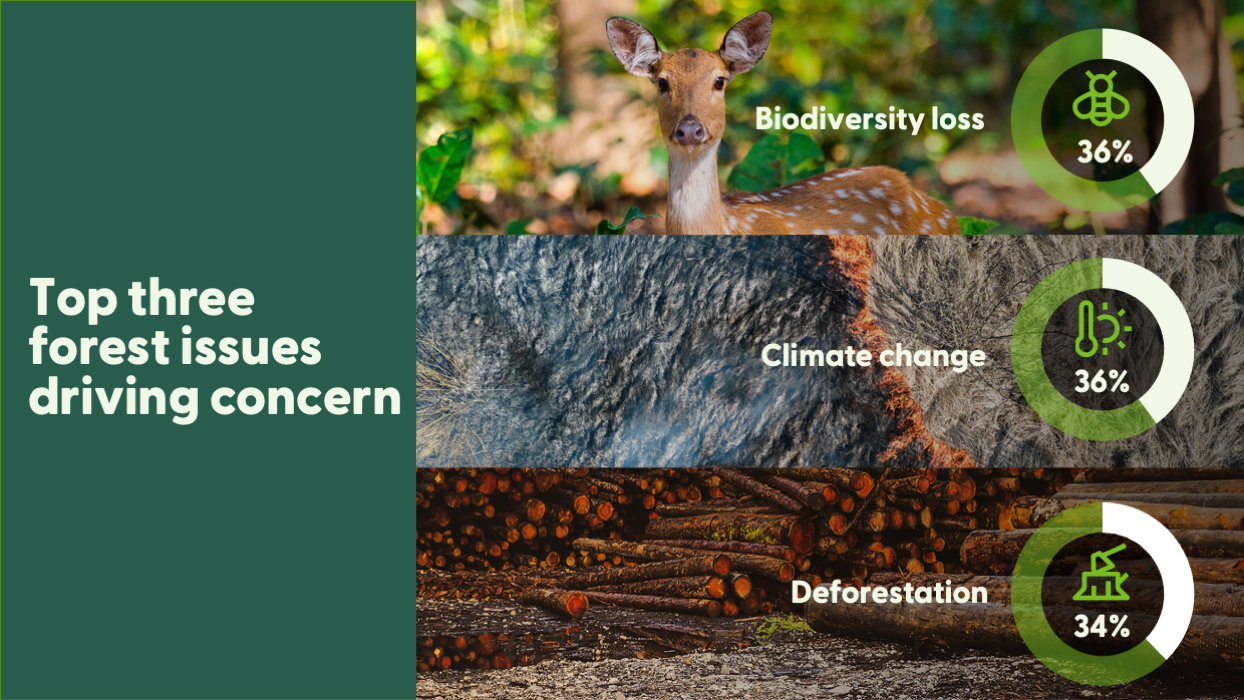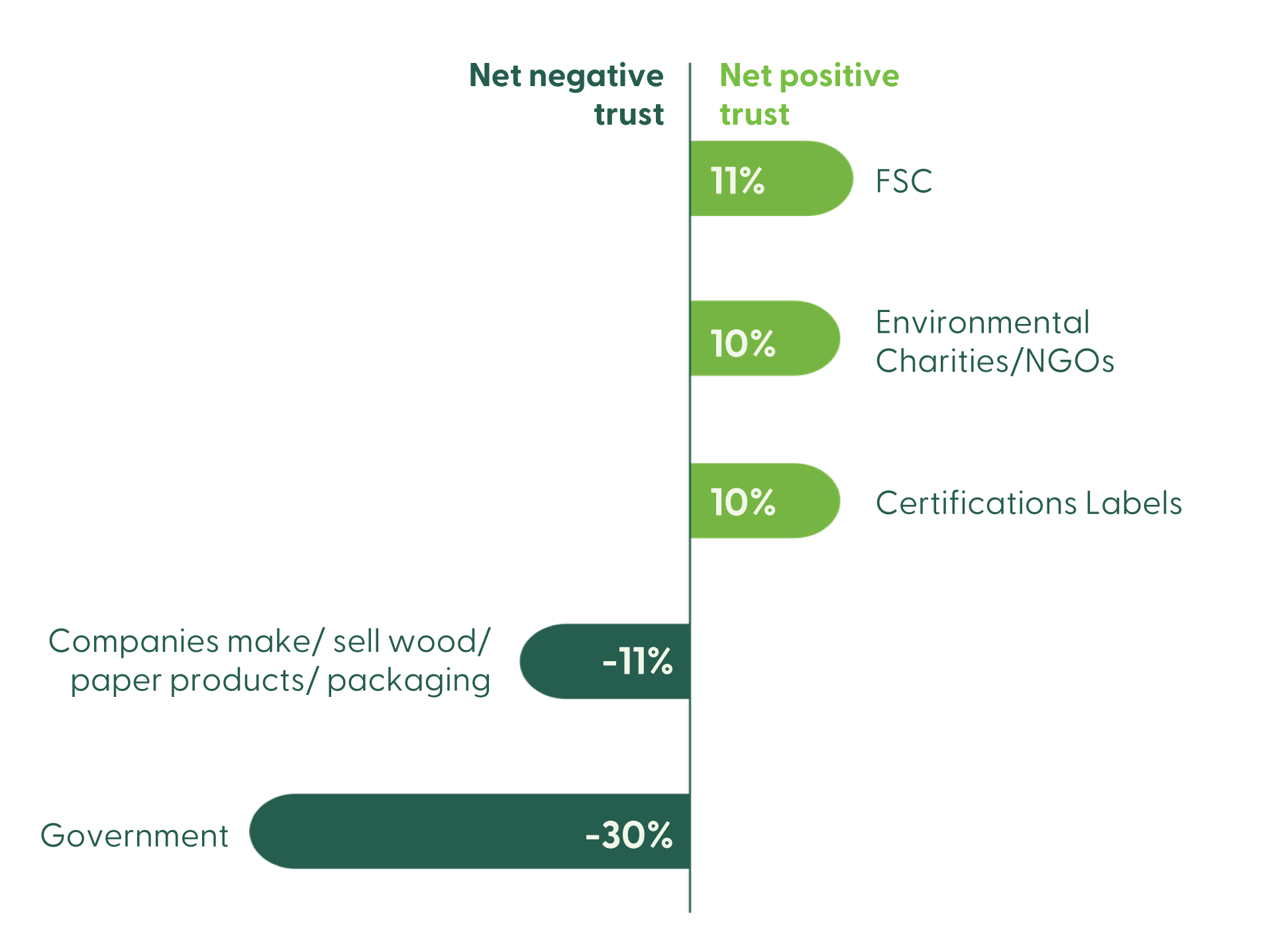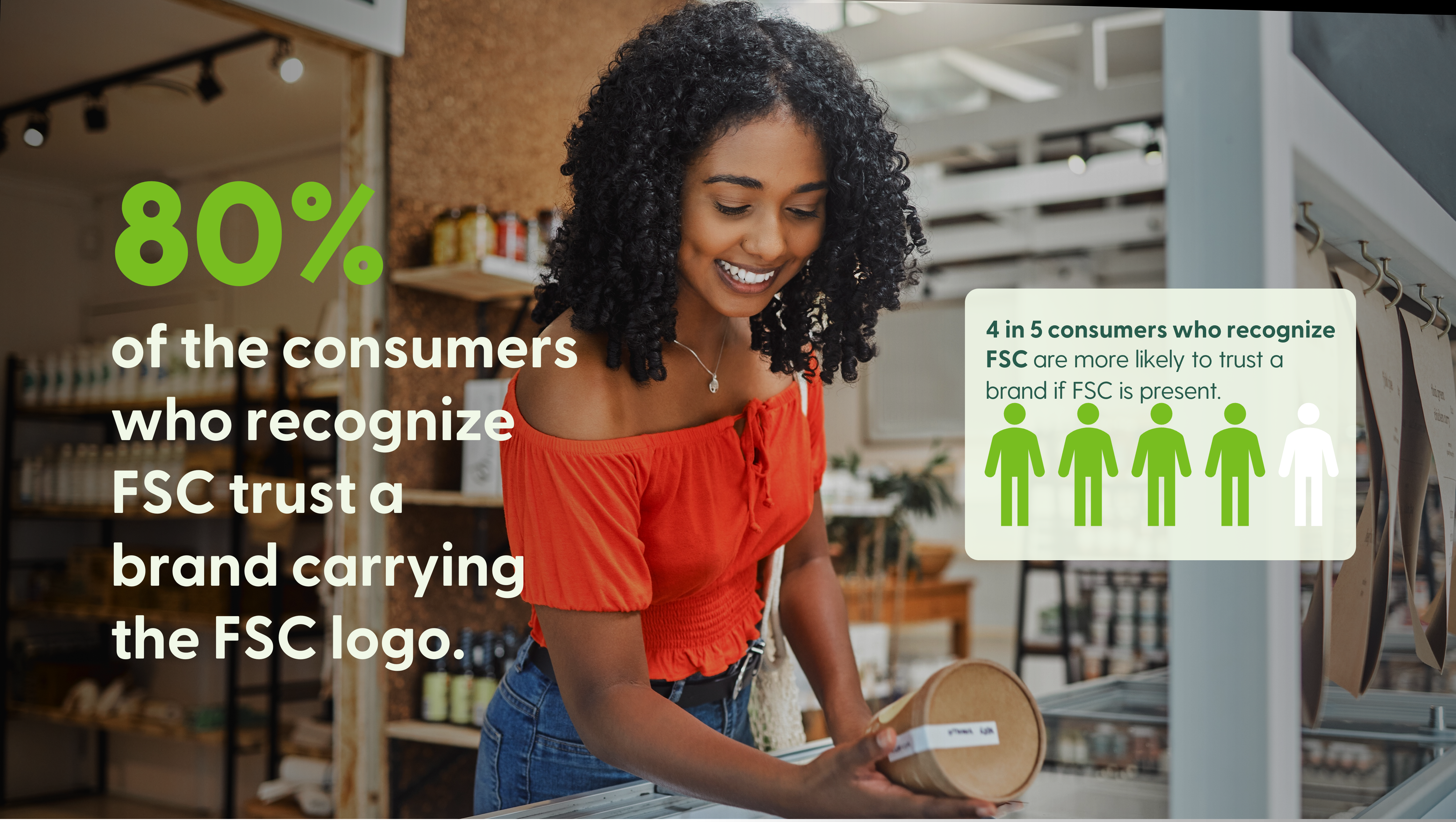
One of the world’s largest consumer studies on forests reveals a strong commitment to addressing biodiversity and climate concerns through sustainable shopping.
A new global study commissioned by FSC with IPSOS is one of the largest of its kind, surveying 26,800 consumers in 33 countries. It provides new insights into what consumers are concerned about, who they trust to address these concerns, and how they’re acting individually through their purchases to affect change.

Biodiversity loss, climate change, and deforestation: persistent top concerns for forests
Ongoing global economic instability and conflict appear to have shifted consumer priorities. While climate change ranked second after health during the pandemic, top concerns for consumers are now economic hardships, and wars, conflicts and terrorism. Yet issues relating to the environment haven’t fallen off the radar. Climate change, biodiversity loss, and deforestation remain key forestry issues of concern around the world.
When asked about forests in particular, the connection to biodiversity is strong – often stronger than climate. Biodiversity loss is a top forest concern for consumers in most of the countries sampled in Europe and the Americas. Europeans regard climate change as nearly equally concerning, while the top concern for the Germans is the loss of tropical rainforests and wildfires for the Spaniards.
From Brazil to Indonesia: localised forest worries mirror climate threats
Some countries experience local forestry issues; concerns about these are reflected in the results. For example, illegal logging in Romania or deforestation in Brazil. This reflects the fact that the impacts of climate change are increasingly being felt directly in the ground like flooding in Indonesia or wildfires in Spain and the USA.
Consumers are taking action to address forest issues with their purchases
One of the ways in which consumers are addressing their forest concerns is through their purchasing decisions. Nearly three quarters (71%) claim they would rather choose products that do not damage plants and animals while nearly two thirds (63%) try to buy products packaged with renewable materials. Almost as many (59%) prefer to choose products that do not contribute to the climate crisis.
Consumers place more trust in independent certification than Businesses and Governments
When it comes to protecting forests, consumers currently put the highest trust in independent and credible certification systems and environmental NGOs. Most consumers have high or moderate confidence in certification labels to ensure that forests are protected. But they feel strongly that sustainability certifications must also be verified. Almost two thirds of consumers (64%) expect sustainability information to be certified by an independent organisation. China (86%) and Kenya (78%) have the highest demand from consumers globally for independent certification of forest-based products.

On the other hand, half (49%) of the consumers surveyed have little to no confidence in government bodies to protect forests. Consumer trust in governments appears not to have been influenced significantly by recent government-led forest initiatives such as the European Union Deforestation Regulation and pledges made during global climate discussions, for example the Glasgow Leaders’ Declaration on Forests and Land Use that came out of COP26.
FSC is the clear leader as the most recognised forest certification worldwide
Across 33 countries globally, nearly half (46%) of consumers surveyed recognise the FSC logo, higher than any other forest certification system tested. Recognition is highest among 18 to 24 year-olds. FSC is especially well recognised in China, UK, Germany, Brazil, Italy, and Denmark. In terms of spontaneous awareness, Danish consumers are most familiar with FSC, with one in ten being aware of FSC as a certification label without prompting. Spontaneous awareness is also high in China and Germany (7%).
Consumers are choosing FSC with confidence
Over three quarters of consumers (77%) show moderate to high levels of confidence in FSC to protect forests, which is considerably higher than in governments or businesses1. This trust translates into action as 3 out of 5 consumers (62%) who recognise FSC claim that they will choose an FSC-certified product instead of an equivalent non-certified product. And even though economic hardship is the top global concern, half of consumers who recognise FSC, claim to be willing to pay more for a product if it is FSC-certified.
This trust extends to brands who choose FSC. 80% of consumers who recognise FSC say they are more likely to trust a brand if it offered FSC-certified products.

FSC offers businesses and governments tangible ways to increase consumer trust
Given consumers’ high trust in FSC, trust in brands that choose FSC, and willingness to choose FSC over others; FSC provides both governments and businesses an opportunity to gain consumer trust through rigorous and independently verified certification.
Many brands and governments already choose FSC. For example, Hunter Boots – established an FSC preference in 2020 that has had a profound effect on the natural rubber-supply value chains and has committed that all natural rubber used will be FSC-certified by 2025. Similarly, Gabon declared that as of 2022, all forest concessions operating in the country will have to be FSC-certified.
By the numbers: Key Takeaways
-
71% of consumers claim they prefer to choose products that do not damage plants and animals.
-
66% expect companies to ensure that the wood/paper products and packaging they sell are not contributing to deforestation.
-
64% expect information about sustainability on products should be certified by an independent organisation.
-
63% claim they try to buy products packaged with renewable materials such as paper instead of plastic.
-
62% believe that they can help protect forests by purchasing products that have been certified by an independent organisation.
-
Across 33 countries globally, almost half of consumers recognise the FSC logo (46%). FSC is especially well recognised in China, UK, Germany, Denmark, Brazil and Italy.
-
Over three quarters of consumers (77%) show moderate to high levels of confidence in FSC to protect forests. Compared to other types of organisations, consumers have the highest confidence in FSC, which is significantly higher than businesses2 or governments.
-
62% of consumers who recognise FSC claim they would choose FSC-certified products over non-certified equivalents. Additionally, nearly half (49%) claim they would pay more for FSC-certified products.
-
80% of consumers who recognize FSC say they are more likely to trust a brand if it offered FSC-certified products.